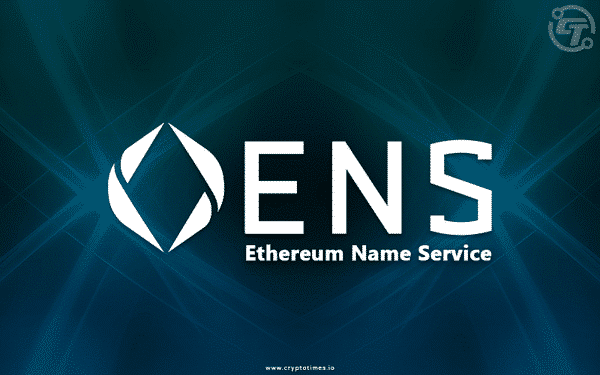In the rapidly evolving landscape of blockchain technology and cryptocurrencies, navigating through complex hexadecimal wallet addresses has been a major challenge for users. However, the Ethereum Name Service (ENS) emerges as a beacon of convenience and user-friendliness, revolutionizing the way we interact with blockchain networks. ENS is a decentralized naming system that simplifies cumbersome wallet addresses, replacing them with human-readable names.
In addition to exploring the Ethereum Name Service (ENS), readers can also discover the convenience of Ethereum Code, an automated bot that streamlines various processes within the Ethereum ecosystem.
What is Ethereum Name Service (ENS)?
The Ethereum Name Service (ENS) is a decentralized domain naming system built on the Ethereum blockchain. Similar to the traditional Domain Name System (DNS) used for mapping website domain names to IP addresses, ENS provides the same functionality but for blockchain addresses. It enables users to associate human-readable names with complex Ethereum addresses, making transactions and interactions more user-friendly and accessible.
How Ethereum Name Service (ENS) Works
The Ethereum Name Service (ENS) operates through a well-defined architecture consisting of three main components: the Registrar, Resolver, and Registry. These components work together to provide a seamless and efficient naming system on the Ethereum blockchain.
At the core of ENS is the Registrar, which acts as the gateway for registering names. Users can go through a simple and straightforward process to secure a name of their choice on the ENS. This involves submitting a bid for the desired name, followed by a reveal phase to prevent front-running. Once the name is successfully registered, the user becomes the owner and gains control over it.
The Resolver component plays a crucial role in the ENS ecosystem by mapping names to the corresponding Ethereum addresses. When someone wants to interact with an ENS name, the Resolver provides the necessary information to locate the associated address. This allows users to send transactions, interact with smart contracts, and access decentralized applications using user-friendly names rather than complex hexadecimal addresses.
Lastly, the Registry serves as the decentralized database that stores and maintains the records of registered names and their ownership. It ensures the integrity and security of the ENS by recording ownership information on the Ethereum blockchain, making it tamper-proof and transparent.
To register a name on the ENS, users need to interact with the Registrar, following the specified process and meeting the required criteria. Once registered, users can manage their ENS names, making updates or transferring ownership as needed. The ENS management interface provides a user-friendly platform to perform these actions, empowering individuals and organizations to have full control over their digital identities on the Ethereum blockchain.
The Ethereum Name Service simplifies the user experience by enabling human-readable and memorable names for blockchain addresses. It eliminates the need to rely on long and complicated hexadecimal addresses, making it easier for individuals and businesses to interact with the Ethereum network.
Benefits and Use Cases of Ethereum Name Service
One of the primary benefits of ENS is its ability to simplify the user experience. Traditionally, interacting with blockchain addresses required users to deal with long and complex hexadecimal addresses, which can be prone to human error. With ENS, users can associate their addresses with human-readable and memorable domain names. This makes it much easier to share addresses, receive payments, and engage in transactions, especially for non-technical users.
ENS also provides a solution for secure and immutable identity management on the blockchain. By linking verified identities to ENS names, users can establish trust and authenticity in their online interactions. This is particularly valuable in situations where identity verification is crucial, such as in financial transactions, decentralized marketplaces, or social platforms.
Decentralized websites are another compelling use case for ENS. With ENS, domain names can point to decentralized content hosted on platforms like IPFS (InterPlanetary File System) or other decentralized storage networks. This enables the creation of censorship-resistant websites, where content cannot be easily removed or tampered with by centralized authorities. ENS-powered decentralized websites foster a more open and inclusive internet, giving individuals the power to publish and share information without relying on centralized entities.
Furthermore, ENS plays a vital role in enabling decentralized applications (DApps) to deliver a more user-friendly experience. By integrating ENS, DApps can offer simplified interfaces that allow users to interact with the blockchain using familiar domain names instead of complex addresses. This not only enhances usability but also reduces the barrier to entry for non-technical users who may be intimidated by the technical intricacies of blockchain transactions.
Additionally, ENS has practical applications in the field of decentralized finance (DeFi). DeFi protocols often rely on Ethereum addresses for various operations, such as lending, borrowing, or yield farming. By utilizing ENS, DeFi platforms can enhance the user experience by enabling users to interact with their services using human-readable names. This simplifies the process of interacting with DeFi protocols, potentially attracting a broader audience and driving further adoption in the DeFi space.
Understanding ENS Integration: How to Use Ethereum Name Service?
Integrating ENS into your Ethereum wallet or application is a straightforward process. Most modern wallets and dApps are ENS-compatible by default, allowing users to leverage the service effortlessly. Here’s a simple guide to get started:
- Set Up an Ethereum Wallet: If you don’t already have an Ethereum wallet, choose a reputable one that supports ENS integration. MetaMask and MyEtherWallet are popular choices.
- Check ENS Availability: Before registering a domain, check if the desired name is available using ENS domain search tools.
- Register Your Domain: Once you find an available domain, use the ENS Registrar to register it under your Ethereum address.
- Link Your Address: After registration, associate your Ethereum address with the newly acquired domain.
- Update ENS Records: If you ever need to change your Ethereum address or transfer ownership, update the ENS records accordingly.
Also Read: How to create your own MetaMask wallet?
Conclusion
With its user-friendly approach, ENS simplifies address interactions, provides secure and immutable identities, facilitates decentralized websites, and enhances the usability of decentralized applications. As blockchain adoption continues to grow, ENS plays a vital role in bridging the gap between complex blockchain addresses and mainstream usability, making Ethereum more accessible and inclusive for all.






